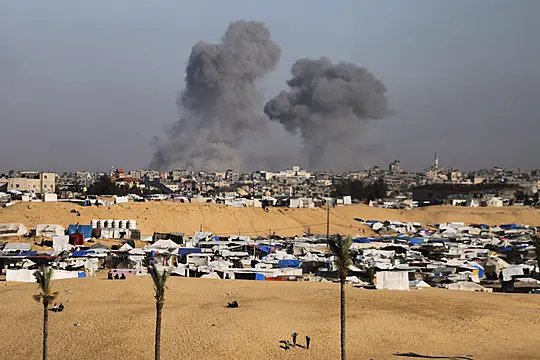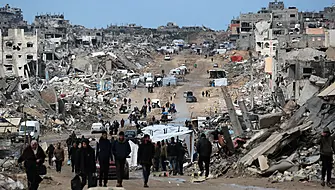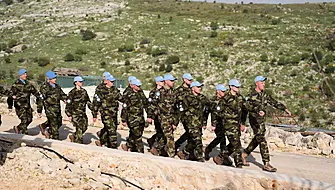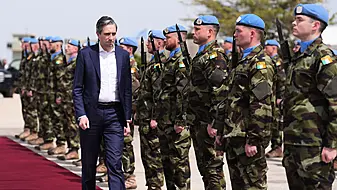Israeli leaders have approved a military operation in the southern Gaza town of Rafah and began striking targets in the area, despite Hamas announcing its acceptance of an Egyptian-Qatari ceasefire proposal.
Hamas’s abrupt acceptance of the deal came hours after Israel ordered an evacuation of Palestinians from eastern neighbourhoods of Rafah, signalling an invasion was imminent.
Israeli Prime Minister Benjamin Netanyahu’s office said the proposal Hamas accepted was “far from Israel’s essential demands” but it would send negotiators to continue talks.
The diplomatic moves and military brinkmanship left a glimmer of hope — but only barely — for an accord that could bring at least a pause in the seven-month war that has devastated the Gaza Strip.
Hanging over the wrangling is the threat of an all-out Israeli assault on Rafah, a move the US strongly opposes and that aid groups warn will be disastrous for 1.4 million Palestinians taking refuge there.
The Israeli military said it was conducting “targeted strikes” against Hamas in eastern Rafah.
President Joe Biden spoke with Prime Minister Benjamin Netanyahu and reiterated US concerns about an invasion of Rafah, telling him a ceasefire was the best way to protect the lives of Israeli hostages, according to a National Security Council spokesperson.
State Department spokesman Matthew Miller said US officials were reviewing the Hamas response “and discussing it with our partners in the region”. An American official said the US was examining whether Hamas agreed to a version of the deal that had been signed off on by Israel and international negotiators.
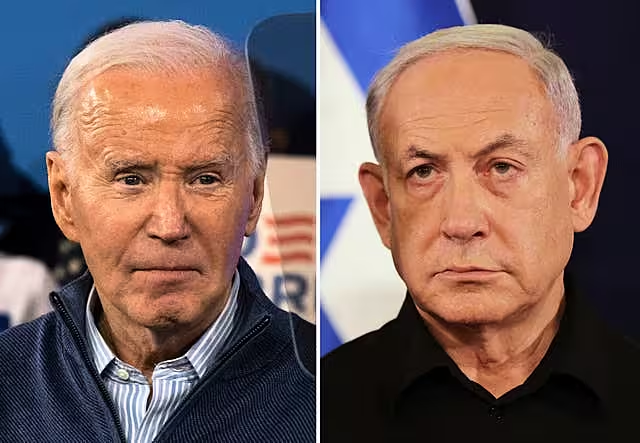
Details of the proposal have not been released. Touring the region last week, US secretary of state Antony Blinken had pressed Hamas to take the deal, and Egyptian officials said it called for a ceasefire in stages starting with a limited hostage release and partial Israeli troop pullbacks within Gaza.
The two sides would also negotiate a “permanent calm” that would lead to a full hostage release and greater Israeli withdrawal from the territory, they said.
Hamas had been seeking clearer guarantees for its key demand of an end to the war and complete Israeli withdrawal in return for the release of all hostages, according to Egyptian officials.
Mr Netanyahu and other Israeli leaders have repeatedly rejected that trade-off, vowing to keep up their campaign until Hamas is destroyed after its October 7 attack on Israel that triggered the war.
Thousands of Israelis rallied around the country on Monday night calling for an immediate agreement. About 1,000 protesters gathered near the defence headquarters in Tel Aviv, where police tried to clear the road. In Jerusalem, about 100 protesters marched toward Mr Netanyahu’s residence with a banner reading: “The blood is on your hands”.

Israel says Rafah is the last significant Hamas stronghold in Gaza, and Mr Netanyahu said on Monday that the offensive against the town is vital to ensure the militants cannot rebuild their military capabilities.
After the Israeli evacuation order was issued, Mr Miller said the US has not seen a credible and implementable plan to protect Palestinian civilians. “We cannot support an operation in Rafah as it is currently envisioned,” he said.
Aid agencies have warned that an offensive will bring a surge of civilian deaths in an Israeli campaign that has already killed 34,000 people and devastated the territory. It could also wreck the humanitarian aid operation based in Rafah that is keeping Palestinians across the Gaza Strip alive, they say.
UN High Commissioner for Human Rights Volker Turk on Monday called the evacuation order “inhumane”.
“Gazans continue to be hit with bombs, disease and even famine. And today, they have been told that they must relocate yet again,” he said. “It will only expose them to more danger and misery.”
Israeli military leaflets were dropped ordering evacuation from eastern neighbourhoods of Rafah, warning that an attack was imminent and anyone who stays “puts themselves and their family members in danger”.
The military told people to move to an Israel-declared humanitarian zone called Muwasi, a makeshift camp on the coast. It said Israel has expanded the size of the zone and that it includes tents, food, water and field hospitals.
Around 450,000 displaced Palestinians are already sheltering in Muwasi. The UN agency for Palestinian refugees, known as UNRWA, said it has been providing them with aid but conditions are squalid, with few toilets or sanitation facilities in the largely rural area.
Jan Egeland, secretary-general of the Norwegian Refugee Council, condemned the “forced, unlawful” evacuation order and the idea that people should go to Muwasi.
“The area is already overstretched and devoid of vital services,” he said, adding that an Israeli assault could lead to “the deadliest phase of this war”.
Israel’s bombardment and ground offensives in Gaza have killed more than 34,700 Palestinians, around two-thirds of them children and women, according to Gaza health officials.
More than 80% of the population of 2.3 million have been driven from their homes, and hundreds of thousands in the north are on the brink of famine, according to the UN.
